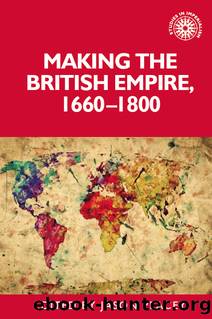Making the British Empire, 1660-1800 by Jason Peacey

Author:Jason Peacey [Peacey, Jason]
Language: eng
Format: epub
ISBN: 9780719088568
Goodreads: 31114159
Publisher: Manchester University Press
Published: 2018-01-02T00:00:00+00:00
Tory political economy
Metropolitan goals and the RAC
Though they did not directly compare themselves with the Spanish empire, through the Restoration Charles II and James II pursued a series of economic programmes designed to create a British empire in the Spanish image and challenge their most powerful rival in the Caribbean. They disagreed with Whigs like Coke about the causes of Spanish imperial decline, and believed that control of colonial land, labour and âthe excess and predominancy [sic] of foreign tradeâ regulated by the state was necessary for Englandâs increasing overseas wealth and power.16 As a result, they sought to expand the land mass of their empire across the world, import a labour supply and increase trade at the expense of their rivals through state regulation and monopoly companies like the RAC. By the 1680s, these ideas about the political economy of the empire would become identified with a wider Tory programme that included alliance with the French against the Dutch, primacy of the monarchy and use of the royal prerogative.
One of the goals of the emerging Tories was the expansion of imperial territory, which they did through marriage, warfare and proprietary grants. The Stuart kings gained Tangier and Bombay with the Portuguese match, supported new proprietary colonies in coveted areas like Carolina, New Jersey and the Bahamas, and promoted attacks on the Dutch and Spanish in New York and across the Caribbean. In so doing, they took land either claimed or occupied by their European rivals in the Americas. They hoped to expand further, suggesting the plantation of colonies in the valuable land near the Spanish empire where, âif they have been at first planted ⦠they would be this time have run down as far as the silver minesâ.17
This territory would need to be held by a settler population and worked by labourers coming from Europe, the Americas or Africa. Stuart imperial promoters and Tory political economists like Carew Reynell and president of the East India Company Josiah Child recognised âlands (though excellent) without hands proportionable will not enrich any kingdomâ.18 In this they resembled their Spanish counterparts, who argued for the centrality of settlement to the success of the early empire.19 Yet while they accepted that labour was essential to imperial production, they did not believe that empire had depopulated Spain, and therefore were not concerned that it would prove a danger to Englandâs domestic population or economic capabilities. Instead, Tory political economists argued that it was Spainâs intolerant religious policies, such as the use of the Inquisition and expulsion of the moriscos, that had led to population decline. More importantly, poor monetary policy, interest rate management and a decline in manufactures resulting from a flood of cheap foreign imports were ultimately responsible for a large portion of Spainâs economic trouble. The profits of empire accrued to other European countries because Spain imported rather than producing goods for colonial consumption, a problem that England could easily avoid in its own empire by promoting domestic manufacturing.20 The colonies would
Download
This site does not store any files on its server. We only index and link to content provided by other sites. Please contact the content providers to delete copyright contents if any and email us, we'll remove relevant links or contents immediately.
The Goal (Off-Campus #4) by Elle Kennedy(13678)
Kathy Andrews Collection by Kathy Andrews(11839)
Diary of a Player by Brad Paisley(7584)
Assassin’s Fate by Robin Hobb(6225)
What Does This Button Do? by Bruce Dickinson(6208)
Big Little Lies by Liane Moriarty(5806)
Altered Sensations by David Pantalony(5106)
Pale Blue Dot by Carl Sagan(5012)
Sticky Fingers by Joe Hagan(4204)
The Death of the Heart by Elizabeth Bowen(3625)
The Heroin Diaries by Nikki Sixx(3552)
Confessions of a Video Vixen by Karrine Steffans(3311)
Beneath These Shadows by Meghan March(3309)
How Music Works by David Byrne(3272)
The Help by Kathryn Stockett(3150)
Jam by Jam (epub)(3095)
Harry Potter 4 - Harry Potter and The Goblet of Fire by J.K.Rowling(3076)
Computational Linguistics and Intelligent Text Processing: 20th International Conference, CICLing 2019 La Rochelle, France, April 7â13, 2019 Revised Selected Papers, Part I by Alexander Gelbukh(2996)
Strange Fascination: David Bowie: The Definitive Story by David Buckley(2872)
